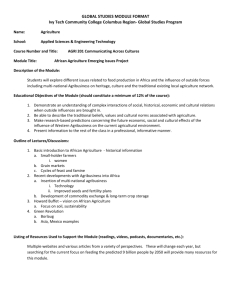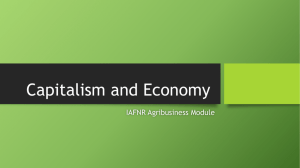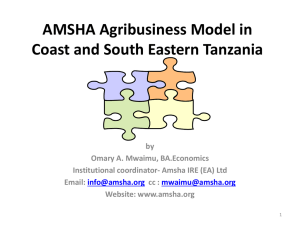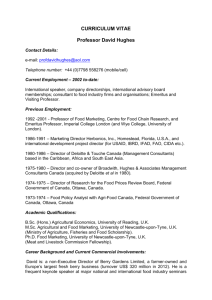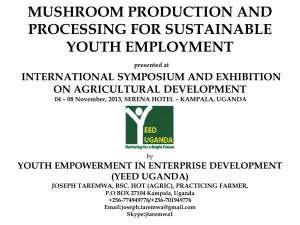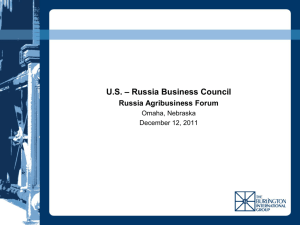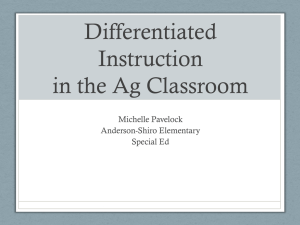IAFNR.AB.2.LP.1.0 - NAAE Communities of Practice
advertisement
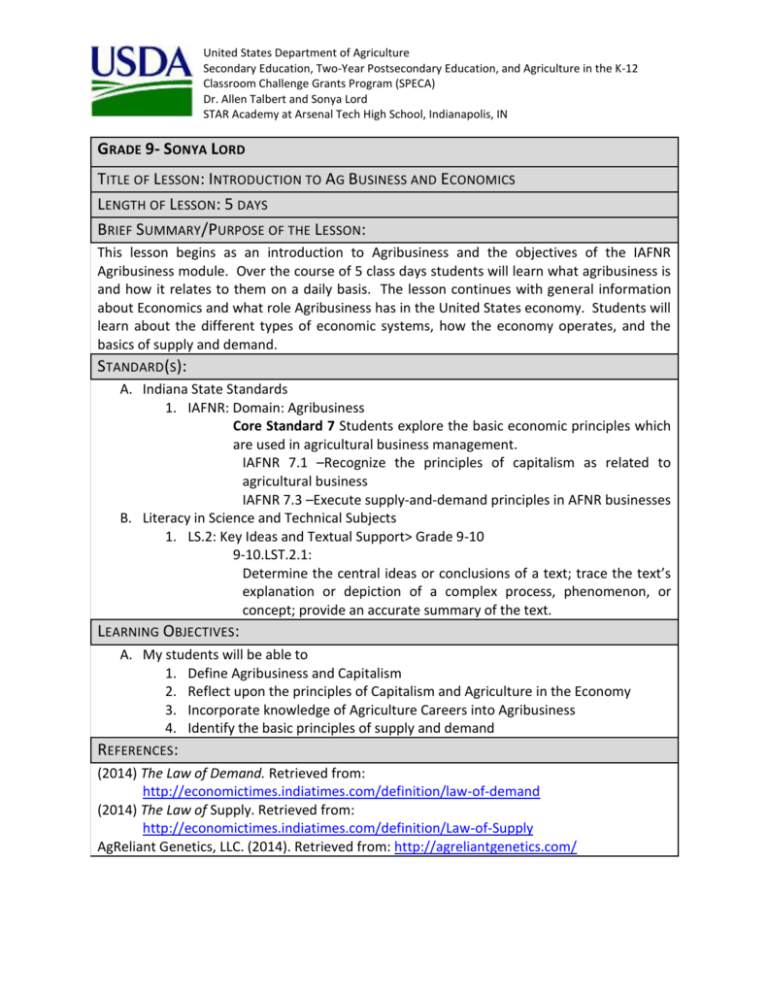
United States Department of Agriculture Secondary Education, Two-Year Postsecondary Education, and Agriculture in the K-12 Classroom Challenge Grants Program (SPECA) Dr. Allen Talbert and Sonya Lord STAR Academy at Arsenal Tech High School, Indianapolis, IN GRADE 9- SONYA LORD TITLE OF LESSON: INTRODUCTION TO AG BUSINESS AND ECONOMICS LENGTH OF LESSON: 5 DAYS BRIEF SUMMARY/PURPOSE OF THE LESSON: This lesson begins as an introduction to Agribusiness and the objectives of the IAFNR Agribusiness module. Over the course of 5 class days students will learn what agribusiness is and how it relates to them on a daily basis. The lesson continues with general information about Economics and what role Agribusiness has in the United States economy. Students will learn about the different types of economic systems, how the economy operates, and the basics of supply and demand. STANDARD(S): A. Indiana State Standards 1. IAFNR: Domain: Agribusiness Core Standard 7 Students explore the basic economic principles which are used in agricultural business management. IAFNR 7.1 –Recognize the principles of capitalism as related to agricultural business IAFNR 7.3 –Execute supply-and-demand principles in AFNR businesses B. Literacy in Science and Technical Subjects 1. LS.2: Key Ideas and Textual Support> Grade 9-10 9-10.LST.2.1: Determine the central ideas or conclusions of a text; trace the text’s explanation or depiction of a complex process, phenomenon, or concept; provide an accurate summary of the text. LEARNING OBJECTIVES: A. My students will be able to 1. Define Agribusiness and Capitalism 2. Reflect upon the principles of Capitalism and Agriculture in the Economy 3. Incorporate knowledge of Agriculture Careers into Agribusiness 4. Identify the basic principles of supply and demand REFERENCES: (2014) The Law of Demand. Retrieved from: http://economictimes.indiatimes.com/definition/law-of-demand (2014) The Law of Supply. Retrieved from: http://economictimes.indiatimes.com/definition/Law-of-Supply AgReliant Genetics, LLC. (2014). Retrieved from: http://agreliantgenetics.com/ United States Department of Agriculture Secondary Education, Two-Year Postsecondary Education, and Agriculture in the K-12 Classroom Challenge Grants Program (SPECA) Dr. Allen Talbert and Sonya Lord STAR Academy at Arsenal Tech High School, Indianapolis, IN Gibson, J. D., Usry, R. H., Hass, L.W., Liles, R.T., & Moore, G.E. (2001). Agribusiness Management, Marketing, Human Resource Development, Communication, and Technology. Danville, IL: Interstate Publishers, Inc. Merriam-Webster’s Dictionary (2014). Agribusiness. Retrieved from http://www.merriamwebster.com/dictionary/agribusiness Merriam-Webster’s Dictionary (2014). Capitalism. Retrieved from http://www.merriamwebster.com/dictionary/capitalism Merriam-Webster’s Dictionary (2014). Commodity. Retrieved from http://www.merriamwebster.com/dictionary/commodity Newman, M.E., & Wills, W. J. (1994). Agribusiness Management and Entrepreneurship. Danville, IL: Interstate Publishers, Inc. Purdue University. (2014). Academic Programs Plan of Study. Retrieved from: https://ag.purdue.edu/oap/Pages/major.aspx Purdue University. (2014). Academic Programs Plan of Study Agribusiness: Agribusiness Management. Retrieved from: https://ag.purdue.edu/oap/Documents/majors/2014/AGMG2014.pdf Ricketts, C., & Ricketts, K. (2009). Agribusiness Fundamentals & Applications. New York: Delmar Cengage Learning. United States Environmental Protection Agency. (2013). State Water Facts. Retrieved from: http://www.epa.gov/watersense/our_water/state_facts.html. MATERIALS: Lesson Plan and Attachments Composition Book Writing Utensil PROCEDURES: A. Bell-Ringer 1. Day 1-Word of the Day: Agribusiness 2. Day 2-Word of the Day: Capitalism 3. Day 3-Bell-Ringer Activity a. Now that you have learned more about Agribusiness, describe three careers in Agribusiness 4. Day 4-Bell-Ringer Activity a. Explain the difference between scarcity and a shortage 5. Day 5-Bell-Ringer Activity a. What have we learned about Agribusiness and the Economy? Be prepared to discuss as a class B. Motivation 1. Day 1-The Life cycle of a Cheeseburger Activity a. Backward Map the life cycle of the cheeseburger and discuss how each part of the Burger is a product of the Agriculture Industry i. For more information see Ricketts pg. 8 Figure 1-4 United States Department of Agriculture Secondary Education, Two-Year Postsecondary Education, and Agriculture in the K-12 Classroom Challenge Grants Program (SPECA) Dr. Allen Talbert and Sonya Lord STAR Academy at Arsenal Tech High School, Indianapolis, IN C. Day 1 Procedure: 1. Introduction to Agribusiness Presentation a. What is agribusiness? b. How does agribusiness affect us? i. Review what was discussed in Bell-Ringer Activity c. Explain history of agricultural practices i. Think-Pair-Share opportunity for students to discuss transition of Agriculture history to modern agriculture. ii. See IAFNR.AB.2.IR.1 d. Briefly discuss success of Agribusiness i. Increase of production and efficiency 2. Group Business Project a. Present and explain expectations of the project to students and inform them of due date at the end of the module b. Answer any questions students may have D. Day 1 Closing: 1. Exit Ticket a. Bring up “The Big Picture” diagram from presentation and ask class, “What is Agribusiness again?” E. Day 2 Procedure: 1. Capitalism and Economics Presentation a. Discuss three components of Economics on slide i. Give examples of the difference between Wants and Needs b. Explain the three Economic Questions c. Briefly describe each of the economic systems d. Define Capitalism e. Discuss the role that capitalism has in Agribusiness through its major principles f. Explain the U.S. Economy and its differences from previously mentioned economic systems 2. Assign Reflection Homework a. Ask students to explain and reflect upon how capitalism works and what role they and their family play in the United States Economy i. Suggested length ½ page (no more than 1 page) b. Due tomorrow at the beginning of class F. Day 2 Closing: 1. Exit Ticket a. Ask class for three things they learned today i. Have students raise their hand to share one statement each G. Day 3 Procedure: 1. Finish Capitalism and Economics Presentation 2. Careers in Agribusiness Presentation United States Department of Agriculture Secondary Education, Two-Year Postsecondary Education, and Agriculture in the K-12 Classroom Challenge Grants Program (SPECA) Dr. Allen Talbert and Sonya Lord STAR Academy at Arsenal Tech High School, Indianapolis, IN H. I. J. K. L. a. Discussion based upon Bell-Ringer Activity b. Local Agribusiness Examples c. Education in Agribusiness 3. Allow students to begin working on their Group Business Projects until the end of class-(Recommend brainstorming company name and organization) Day 3 Closing: 1. Exit Ticket a. Short Teacher-led review of presentation(s) b. Students will write down any questions they still have about Capitalism and Economics Day 4 Procedure: 1. Economics of Agribusiness Presentation a. How does the U.S. Food and Fiber System relate to what we know of as The Big Picture of Agribusiness? b. Discuss all parts of the Product Circular Flow Table c. How are we reacting to scarcity today? d. Explain the basics of Supply and Demand i. How they determine quantity and price 2. Scarcity Activity a. How would we live without necessary resources? b. See IAFNR.AB.2.IR.1 Day 4 Closing: 1. Exit Ticket a. Discuss with a partner one thing you learned today about Supply and Demand. Day 5 Procedure: 1. Finish Supply and Demand in Agribusiness Presentation 2. Brief Teacher-led review of this lesson a. What is Agribusiness? b. Capitalism and the Economy c. Supply and Demand 3. Administer Pop Quiz 4. Allow students to continue working on their Group Business Projects until the end of class. Day 5 Closing: 1. Exit Ticket a. Write down any questions you may still have about economics of agribusiness on a piece of paper and turn it into the teacher as you leave. ASSESSMENT: Formative: A. Check for Understanding throughout presentations and discussions United States Department of Agriculture Secondary Education, Two-Year Postsecondary Education, and Agriculture in the K-12 Classroom Challenge Grants Program (SPECA) Dr. Allen Talbert and Sonya Lord STAR Academy at Arsenal Tech High School, Indianapolis, IN B. Reflection homework assignment Summative: A. Basics of Agribusiness Pop Quiz SUPPORTS AND ACCOMMODATIONS FOR SPECIAL NEEDS A. IEP’s 1. Allowance to take quiz in separate area with teacher/aid assistance a. Reading quiz questions aloud 2. Extra time to take pop quiz B. G&T 1. Projects in this lesson allow for the expansion of learning and creativity for students on an individual level
